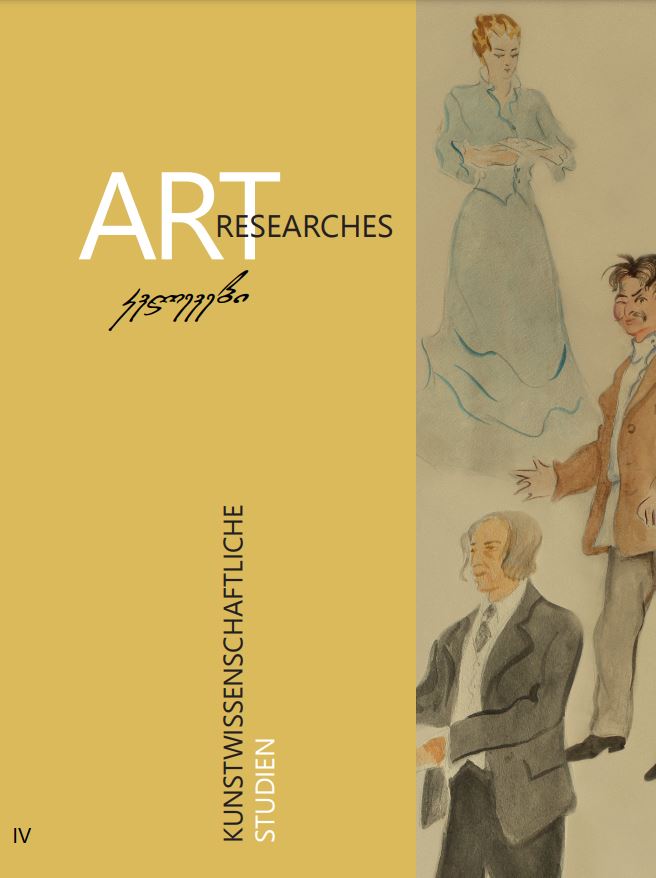Rezo Chkheidze – The Patriarch Of Georgian Cinema
Main Article Content
Abstract
Rezo Chkheidze is an important figure in Georgian film. His name is associated with the first international recognition of Georgian film. He was also the director of many films that were popular among the masses. This popularity extended not only to Georgia, but to the whole territory of the Soviet Union. Rezo Chkheidze was the first Georgian who had the opportunity to shoot the film abroad within the framework of international co-production. For many years he was the director of the Georgian Film Studio “Georgian Film” and directly participated in the creation of Georgian cinematography. It is true that the young generation had baptised him a negative figure, which had a certain prerequisite (he was a civil servant with whose name is associated the process of privatisation of film theatres and other properties in the 1990s, as well as the fact that he made less interesting films at the end of his career, etc.). But today, these stereotypical allegories of one-sided liberal discourses and hypocrisy associated with his personality should be subject to revision.
This article is an attempt to take a holistic approach to the work of a Soviet film director, using Rezo Chkheidze as an example. His biography arouses a sense of dissonance in the reader – Rezo Chkheidze was the son of victims of Stalin’s repressive measures and became a significant figure in Soviet culture, a functionary. In Rezo Chkheidze’s films, the author always takes the side of the weak and oppressed, which is most evident in his most important film, “Magdana’s Donkey” (original title: Magdana’s Lurja), on the background of the class struggle. In this respect, one could explain Rezo Chkheidze’s decision of personal demarcation as his idealism. However, this aspect is still not explicitly emphasised and dealt with in the specialist literature and textbooks on film history.
Over the course of many years, Rezo Chkheidze headed the only film studio in Georgia “Georgian Film” (“Kartuli Pilmi”). This position made him a protectionist of Georgian film directors. He spent most of his creative work dealing with the phenomenon of his father. From “Magdana’s Donkey” to his last film “Candle Lit at the Saviour’s tomb” – the symbol of the father is perceived everywhere: his loss, the desire to search for him, or the director describes both the difficulty and the joy of being a father.
Rezo Chkheidze’s biography begins with his repressed father – the writer David Chkheidze, a member of the first Bolshevik movement. He worked as a teacher in Kutaisi, directed the local theatre, wrote plays and novels. But eventually became a victim of repressive measures. The young Rezo Chkheidze had no financial means to study in Moscow at the “State All-Union Institute of Cinematography” (abbreviated as WGIK). But after his father’s rehabilitation and thanks to his father’s library, he managed to do so and ended up in the workshop of Mikhail Romm and Sergei Yutkevich.
Education has always been of great importance to Rezo Chkheidze. In 1972, together with his peers, he founded the Faculty of Film at the State University of Theatre Arts. This marked a new development perspective for Georgian film – the possibility of being relatively less dependent on the Soviet metropolis. The relationship to Moscow has a special place in Rezo Chkheidze’s biography. As with many representatives of his generation, the Russian colonial construct is expressed in a controversial and bipolar view (in love and hate of Moscow). In 1991, Rezo Chkheidze returns the highest state prize of the USSR the Lenin Prize, awarded to him for his film “Party Secretary of the Regional Committee” – he does not accept it, which is related to the attainment of independence, although he lives the next years in the Russian limelight.
When exploring Rezo Chkheidze’s oeuvre, the image of an idealistic director who dreams of creating a paradise on earth emerges. In the beginning, this is expressed in the belief in the idea of a “communist paradise”, which is replaced by religious motifs in the following years.
For Rezo Chkheidze’s generation, Russia already became a kind of alternative to the West in the 1990s, after the disappointment of unfulfilled exaggerated hopes. Some were seized by a passion to return to the Russian Empire after the “Rose Revolution”; but colonial sentimentalities were not peculiar to all representatives of this generation. Many had found the transition from the old value system to the new difficult. Even the allies of the “empire” found the injustice, ruin and permissiveness instilled by anarchist and savage capitalism beneficial, all the things that made the Georgian population needy and have not offered a better system to this day. In this respect, the film “Candle Lit at the Saviour’s tomb” can be considered a moralistic response to the “Rose Revolution”.
Rezo Chkheidze’s first and last films are united by the will to fight injustice, although the last film, “”Candle lit at the Savior’s tomb”, is a primitive kitschy opus that is an extremely striking example of the devaluation of the auteur in the history of Georgian cinema. In Rezo Chkheidze’s first films we see great ideas, but in the director’s last film we discover not the juxtaposition of materialist utopia, but the juxtaposition of idealistic, more accurately formulated biblical paradise. To offer a certain anaesthetic (“religion is the opium of the people” – K. Marx) instead of combating real problems is at least immoral. But this amorality flourished soon after the preservation of independence and after the coup almost in all spheres – in politics as well as in the economy, in art and religion.
